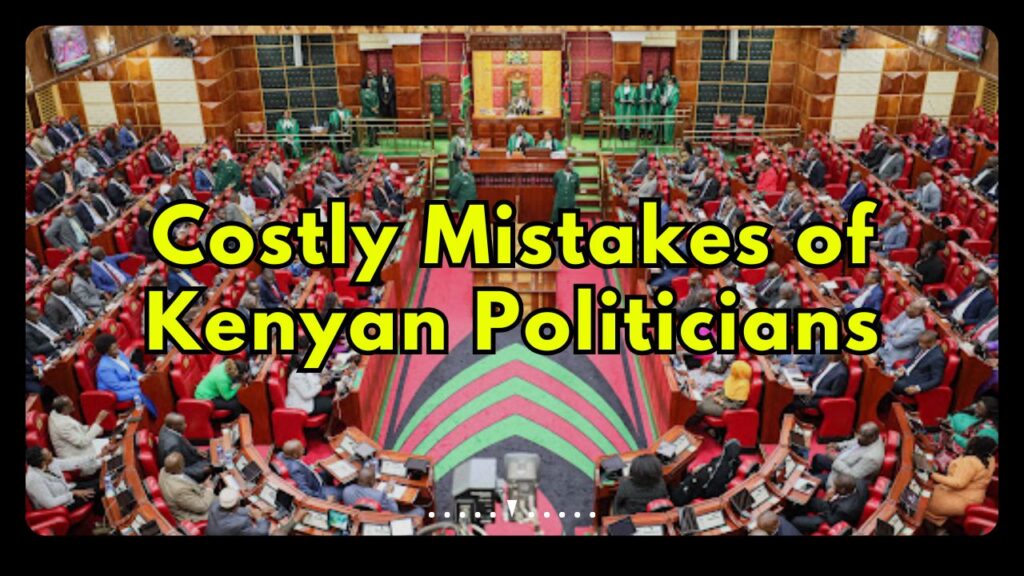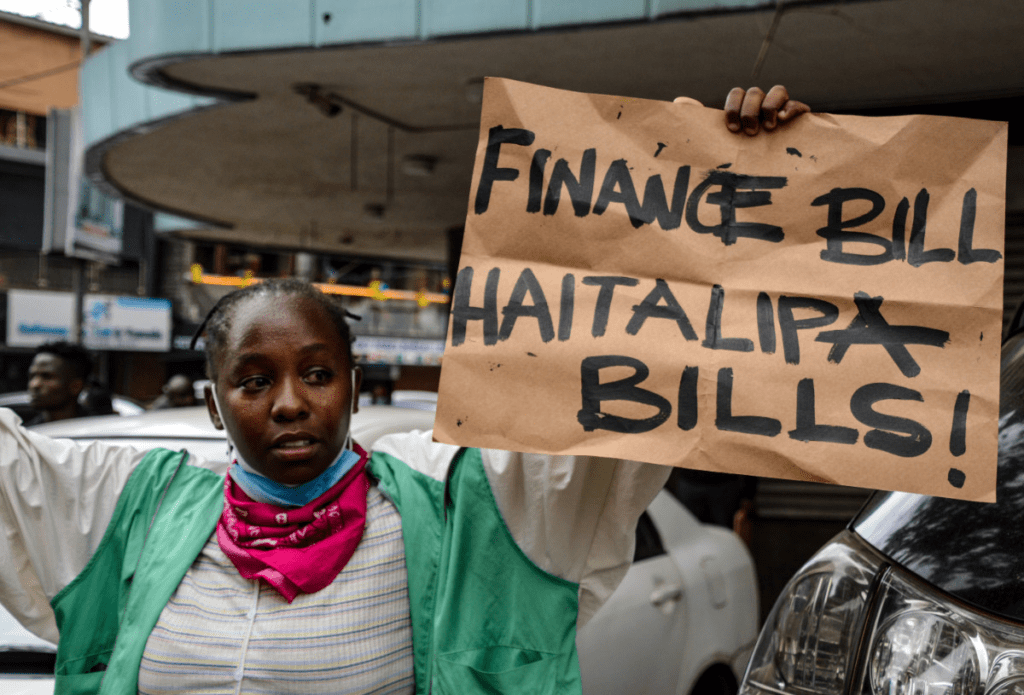
Costly Mistakes of Kenyan Politicians
Kenya’s political landscape has long been shaped by cycles of empty promises, rampant corruption, and divisive tactics, costing the nation socially, economically, and politically: Costly Mistakes of Kenyan Politicians. These repeated mistakes have left the majority of Kenyans disillusioned. But there’s a new force in town: Gen Zs. Kenya’s youngest voting demographic is signaling a bold shift away from the old ways, demanding change, and taking action to create a better future.
Here are some of the most detrimental mistakes made by Kenyan politicians and how Gen Zs are working to change the political landscape.
1. Tribal Politics and Divisive Rhetoric
Kenya’s political sphere is still marred by tribal alliances, with politicians often rallying support based on ethnicity rather than policies or performance. This divisive approach has led to ethnic polarization, especially during election periods, undermining Kenya’s unity and progress.
Gen Z’s Perspective:
Gen Z Kenyans, raised in a more connected digital world, are less influenced by tribal lines and are increasingly unified in their desire for merit-based leadership. This generation values inclusivity and is pushing for a new narrative, one that celebrates diversity rather than pits ethnic groups against each other.
Their Approach: Gen Z is countering tribal rhetoric by using platforms like TikTok, Instagram, and X to celebrate Kenya’s diversity and promote messages of unity. Through hashtags such as #TribalFreeKenya, they are actively rejecting politicians who campaign along ethnic lines. Additionally, Gen Z is organizing cross-tribe youth forums and events to strengthen bonds and emphasize national rather than tribal identity.
2. Economic Mismanagement and Burgeoning Debt
Kenya’s rising national debt remains a source of concern, particularly for the youth, who will bear its long-term impacts. The government’s reliance on debt to fund projects, many of which are perceived as poorly planned or unnecessary, has left the nation heavily indebted. This economic reality raises questions about the sustainability of Kenya’s growth and the burden it places on future generations.
Gen Z’s Perspective:
Gen Z wants leaders who will prioritize fiscal responsibility and sustainable development. They are aware that their future is being mortgaged, often for projects that do not bring direct benefits to the Kenyan people. Gen Z also recognizes that rampant economic mismanagement reduces job opportunities and access to quality services, making life more difficult for young people.
FOLLOW THIS WHATSAPP CHANNEL FOR MORE UPDATES
Their Approach: Gen Zs are championing economic reform through grassroots movements and online platforms. On Twitter, hashtags like #StopTheDebtTrap and #KenyaDebtCrisis are gaining traction, as young Kenyans push for fiscal accountability and demand to know how borrowed funds are being used. Some youth groups are even organizing discussions and webinars to educate their peers on the implications of national debt, fostering a more informed generation that will demand accountability.
3. Police Brutality and Abductions
Kenya has witnessed a worrying trend of police brutality, with numerous reports of excessive force against civilians, including activists and protesters. In recent years, abductions have also been on the rise, especially targeting activists and government critics. Families have reported loved ones missing, with some incidents leading to tragic discoveries. The lack of accountability within law enforcement has created an environment where police abuses go unpunished, leaving citizens fearful and frustrated.

Costly Mistakes of Kenyan Politicians
Gen Z’s Perspective:
Gen Z has had enough of police brutality and forced disappearances. They view these actions as an infringement on human rights and a sign of a government unwilling to uphold justice. This generation demands police reform, accountability, and protection of civil liberties, with zero tolerance for the abuse of power.
Their Approach: Social media platforms are flooded with Gen Z voices condemning police violence and advocating for justice. Hashtags like #EndPoliceBrutalityKE and #JusticeForVictims bring attention to these abuses, often sharing personal stories, rallying for investigations, and calling for police reform. Many Gen Z activists are also coordinating with human rights organizations to lobby for legal changes, including calls for an independent oversight body to investigate police abuses and hold perpetrators accountable.
4. The Finance Bill 2024: A Heavy Burden on Young Kenyans
The Finance Bill 2024 has drawn fierce criticism, particularly from younger Kenyans, who believe it disproportionately affects low-income citizens and young professionals. The bill proposes higher taxes across various sectors, including increased VAT on essential items, which Gen Z argues will further strain a population already struggling with high unemployment and rising costs of living. Critics point out that while the government claims the tax hikes are necessary for development, it has yet to show tangible results from previous tax increases.
Gen Z’s Perspective:
Gen Z Kenyans view the Finance Bill as a symbol of economic mismanagement and believe that it reflects a government disconnected from the realities of its people. This generation wants a balanced approach to fiscal policy that prioritizes job creation, entrepreneurship, and sustainable growth, rather than excessive taxation on everyday Kenyans.

Costly Mistakes of Kenyan Politicians
Their Approach: Online platforms have become the battleground where Gen Z is voicing opposition to the Finance Bill 2024. Influencers, youth groups, and economic analysts have dissected the bill’s provisions, organizing campaigns under hashtags like #RejectFinanceBill2024 to rally public opposition. Some Gen Zs have even appeared in local media, advocating for alternative policies that would alleviate the financial burden on ordinary Kenyans.
5. Healthcare Reforms: SHIF and SHA
The proposed Social Health Insurance Fund (SHIF) and Social Health Authority (SHA) have been introduced to replace the current National Health Insurance Fund (NHIF). While they aim to improve healthcare coverage, there are concerns that SHIF and SHA are poorly planned and underfunded. Critics argue that the new systems place an excessive financial burden on citizens and fail to address the underlying issues in Kenya’s healthcare system, such as accessibility and quality of care.

Costly Mistakes of Kenyan Politicians
Gen Z’s Perspective:
Gen Z sees healthcare as a fundamental right and demands a comprehensive, transparent approach to reform. They are skeptical of SHIF and SHA because of the lack of clarity around funding and the specifics of implementation. For this generation, effective healthcare reform means not only access but also a high quality of service.
Their Approach: Gen Zs are mobilizing on social media to demand greater transparency in the rollout of SHIF and SHA. Through online forums, they are hosting discussions on what meaningful healthcare reform should look like, drawing comparisons with systems in other countries. Activists and influencers are raising awareness about the shortcomings of SHIF and SHA, insisting that healthcare reforms must be more inclusive and better funded and should not burden Kenyan citizens. SHIF Deduction Calculator
6. Corruption and Opaque Deals: The JKIA-KETRACO-Adani Deal
In recent years, Kenya has witnessed increasingly complex and opaque deals, with the JKIA-KETRACO-Adani agreement standing out as a prime example. In this controversial arrangement, the Kenyan government partnered with KETRACO and the Adani Group to develop infrastructure at the Jomo Kenyatta International Airport (JKIA). Critics claim the deal was negotiated in secret, bypassing critical transparency standards and allegedly favoring foreign interests over Kenyans.

Costly Mistakes of Kenyan Politicians
Gen Z’s Perspective:
For Gen Z, transparency is paramount, and they are outraged by the lack of clarity surrounding such high-stakes deals. They want a government that values its citizens over private and foreign interests. In their view, public assets like JKIA should benefit Kenyans, and they demand full disclosure on all such agreements.
Read: Energy CS Wandayi confirms signing of Ksh.95 billion KETRACO, Adani deal
Their Approach: Social media has become a powerful tool for Gen Z, who are rallying support for transparency and accountability using hashtags like #StopAdaniKenya and #JKIADeals. Influencers and activists are demanding an official investigation into the deal’s terms and conditions, while online petitions have garnered significant public support. By bringing these issues to light, Gen Z is putting pressure on the government to be more transparent in its dealings.
Read: JKIA-Adani whistleblower Nelson Amenya claims he has faced threats and intimidation from the DCI
7. Environmental Neglect in Policy
Climate change is affecting Kenya with increasing droughts, floods, and erratic weather patterns that impact food security and water availability. Yet, environmental sustainability is often sidelined in political agendas, leaving Kenya unprepared for climate-related challenges.

Costly Mistakes of Kenyan Politicians
Gen Z’s Perspective:
For Gen Z, environmental conservation is essential. They see the need for immediate action to safeguard their future and are demanding leaders who prioritize sustainable practices and climate resilience.
Their Approach: Gen Z activists like Elizabeth Wathuti are leading the charge, organizing initiatives to plant trees and advocating for environmental policies. They are raising awareness through campaigns like #SaveOurForests and #GreenKenya to pressure politicians into action. Gen Z’s advocacy is forcing environmental issues onto the national agenda, showing that young Kenyans are serious about building a sustainable future
Costly Mistakes of Kenyan Politicians
8. Short-Sighted Economic Policies
Kenyan politicians have often pursued short-term economic policies for quick wins, frequently sacrificing long-term stability for immediate gains. For example, ballooning debt has become a pressing concern, with Kenya’s public debt standing at unsustainable levels. In pursuit of development projects for electoral gain, politicians often engage in borrowing, much of which is directed towards white elephant projects that have little economic benefit.
These poorly planned projects, driven by political rather than developmental agendas, leave a legacy of economic strain. Kenyan citizens now face high taxes and inflation as the government struggles to repay the debts incurred by previous regimes. This debt burden not only limits economic growth but also places a significant load on future generations.
Costly Mistakes of Kenyan Politicians
9. Weak Legislative Oversight
Parliament is intended to hold the executive accountable, but Kenya’s legislature has often failed to provide adequate oversight. Political alliances and personal interests frequently prevent MPs from challenging the executive branch or scrutinizing budget allocations and expenditures.
Without effective oversight, financial mismanagement and policy failures continue unchecked. The absence of accountability undermines democratic processes and erodes the effectiveness of government institutions. Kenyans bear the consequences of weak legislative oversight in the form of inefficient service delivery and unchecked government spending.
How Gen Zs Are Paving the Way for Change
In contrast to the political missteps that have defined Kenyan leadership for decades, Generation Z is reshaping Kenya’s future with new ideals, tools, and initiatives. Empowered by technology, a global perspective, and an inherent drive for change, Kenya’s Gen Zs are working towards a more transparent, inclusive, and innovative Kenya.
FOLLOW THIS WHATSAPP CHANNEL FOR MORE UPDATES
- Digital Activism and Social Media Advocacy: Gen Zs in Kenya have harnessed the power of social media platforms like Twitter(X), Instagram, and Facebook to hold leaders accountable, mobilize movements, and raise awareness on critical issues. The #KOT (Kenyans on Twitter) community has become a force to reckon with, spotlighting issues such as police brutality, corruption, and poor governance. For instance, campaigns like #Free (Name of Abducted Person) demonstrated how social media can bring attention to injustices and amplify public pressure on the government. Social media has become a tool for transparency, where young people expose corruption and demand accountability. Unlike traditional media, which is often censored or influenced by political biases, social media provides an unfiltered platform for activism, enabling Gen Z to initiate discussions on reforms and mobilize both local and international support.
- Entrepreneurial Mindset and Innovation: Faced with high unemployment rates and limited job opportunities, Kenyan Gen Zs have turned towards entrepreneurship as a solution. With initiatives in fields like e-commerce, fintech, and agritech, young entrepreneurs are tapping into Kenya’s potential for technological innovation and economic diversification. Programs like the Ajira Digital Initiative, which aims to equip young people with digital skills, illustrate the power of youth-led initiatives in bridging skill gaps and creating employment opportunities. Kenyan Gen Zs are also leading the shift toward sustainable business practices and community-driven solutions, particularly in sectors like renewable energy and waste management.
- Demand for Inclusive Politics: Gen Zs are advocating for a more inclusive political environment, challenging the old-guard, ethnic-based politics with calls for leaders based on merit and integrity. This generation views themselves less through the lens of tribal identity and more as Kenyans first, advocating for policies that address common concerns rather than sectional interests. This shift in mindset is evident in the rising popularity of young politicians and activists who prioritize issue-based politics. Gen Zs are campaigning for candidates who demonstrate transparency and inclusivity, and they are rejecting the ethnic divisions that have historically hindered national unity.
- Focus on Mental Health and Socio-Political Issues: Kenyan Gen Zs are confronting social issues that have long been stigmatized, such as mental health. This focus on social well-being signifies a more holistic approach to development that goes beyond mere economic progress. Gen Z activists and organizations are initiating conversations around mental health, addressing the impacts of economic and social stressors, and promoting support systems to ensure the well-being of all Kenyans. Through campaigns and awareness programs, Gen Z has been instrumental in breaking the silence surrounding mental health, which is critical for a society that seeks to uplift all its members.
- Pushing for Policy and Legal Reforms: Gen Zs are not only advocating for change but are also actively working towards policy and legal reforms. Organizations such as Amnesty International Kenya have young Kenyans advocating for human rights reforms, transparency, and judicial accountability. Through petitions, demonstrations, and lobbying efforts, Gen Z activists are influencing the legislative process and pressing for amendments that strengthen governance structures and protect citizen rights. This generation’s insistence on a fair and accountable legal system is crucial for establishing the rule of law and ensuring that leaders can no longer exploit public resources without consequence.
Kenya’s political landscape has been marred by mistakes that have caused significant socio-economic setbacks, yet the energy and activism of Gen Z signal a new era. This generation, unfettered by traditional political constraints, is mobilizing for change through digital activism, entrepreneurial ventures, and advocacy for social inclusivity and policy reforms. By tackling the very issues that have kept Kenya from achieving its full potential, Gen Z is redefining leadership and restoring hope among citizens for a more accountable and equitable society.
The future of Kenya lies in the hands of its youth, and Gen Z is proving that with resilience, innovation, and a relentless pursuit of justice, they can transform the political, economic, and social fabric of the nation. This generation’s commitment to a transparent and united Kenya is a powerful force that could indeed reshape the country, paving the way for a society that prioritizes the needs and aspirations of its people above political interests.
Share your views on this X Post:
FOLLOW THIS WHATSAPP CHANNEL FOR MORE UPDATES
SHARE THIS POST


